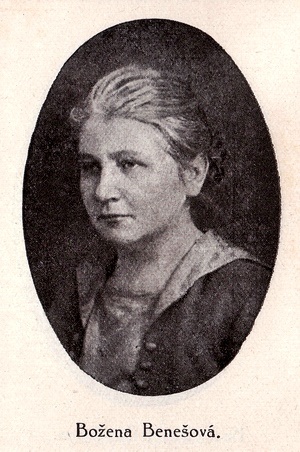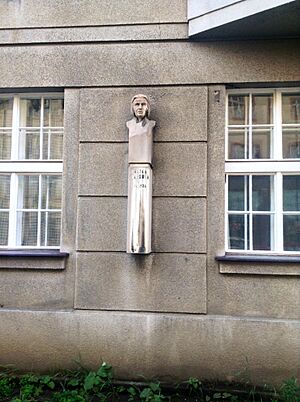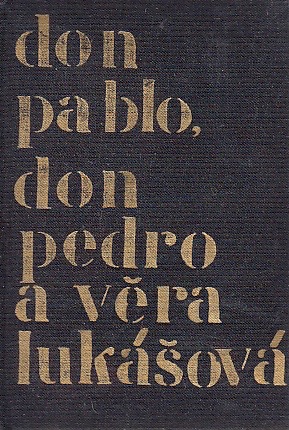Božena Benešová facts for kids
Božena Benešová (born Božena Zapletalová, November 30, 1873 – April 8, 1936) was a talented Czech writer and poet. Her work is known for exploring the inner thoughts and feelings of people, a style called psychological prose. She spent much of her early life in Uherské Hradiště and Napajedla. In 1896, she married Josef Beneš, a railway clerk. Later, in 1908, she and her husband moved to Prague.
Contents
Life of Božena Benešová
Božena Benešová and her husband divorced in 1912. However, they continued to live together until he passed away in 1933. A very important person in her life was the writer Růžena Svobodová. They met in 1902 in Frenštát pod Radhoštěm.
Friendship and Mentorship
Svobodová helped Benešová overcome feelings of sadness after her wedding. She also strongly encouraged Benešová's writing career. The two friends wrote many letters to each other. Svobodová visited Benešová in Moravia, and they even traveled to Italy together several times. Their friendship lasted until Svobodová's death in 1920.
Růžena Svobodová was like a coach for Benešová. She made sure Benešová read and wrote every day. She also pushed her to finish her stories and books. Svobodová also introduced Benešová to František Xaver Šalda. He was a famous Czech literary critic. He greatly influenced Czech writing during his time.
Marie Pujmanová, another novelist and friend of Benešová, shared something interesting. She said that young Benešová loved reading books by Dostoyevsky and Maupassant. But with Šalda's guidance, she admired Flaubert even more.
New Experiences and Moving to Prague
In 1907, Benešová went on her second trip to Italy. This time, she was joined by the well-known Czech poet Josef Svatopluk Machar. He was a leader in the Realist movement.
From 1907 to 1908, Benešová edited a special section. It was called "Woman in Arts" in the newspaper Female Revue. This newspaper focused on women's issues, culture, and society. This experience helped her work with other magazines later on. In 1908, she and her husband decided to move from Moravia to Prague.
Wartime Writing and YWCA Work
During World War I (1914–1918), Benešová wrote two collections of short stories. These were Mice and Cruel Youth. She also began working on her biggest novel, a two-part story called A Human Being.
In 1926, she started a new job. She became a secretary and librarian at the German YWCA. She later led a summer camp there. This job helped her become financially stable. Benešová was very popular with the young women at the YWCA. They even formed a special group called the "Božena Benešová girls." Years later, when she was very ill, she dictated the last chapter of her final book to these same girls. This book was Don Pablo, Don Pedro and Věra Lukášová.
Later Life and Legacy
From 1932 onwards, Benešová was a regular member of the Czech Academy of Arts and Sciences. She passed away on April 8, 1936, at her home in Prague-Bubeneč. She is buried next to her former husband, Josef Beneš, in the local cemetery.
After her death, her final novel was made into a film. The famous artist Emil František Burian directed it. The movie, titled Vera Lukášová, came out in 1939. In 1962, a new edition of her novel was published. It included a short story called "Povídka s dobrým koncem" (A Story with a Happy Ending). This story was later adapted into a TV movie in 1986. Many of Benešová's stories, like those in Myška and Kruté mládí, are about children.
Božena Benešová's Work
Božena Benešová often wrote about young people from small towns. Her characters usually faced inner struggles with loneliness or selfishness. Other writers, like Marie Majerová and Marie Pujmanová, followed in her footsteps. After Benešová died, the literary critic Paul Buzková became the first person to edit her collected works.
Poetry Collections
- Verse True and Untrue (1909)
- Verse (1938)
Novels
- A Human Being (1919–20), a novel in two parts
- The Blow (1926), Part 1 of the Úder trilogy
- Underground Flames (1929), Part 2 of the Úder trilogy
- Rainbow of Tragedy (1933), Part 3 of the Úder trilogy
- Don Pablo, Don Pedro and Věra Lukášová (1936)
Short Story Collections
- Three Tales (1914)
- Mice: Tales from 1909-13 (1916)
- Cruel Youth (1917)
- Silent Girls (1922)
- The Beguiled: A Book of Stories (1923)
- Boys: Stories about Children (1927)
Plays
- Dramas (1937), including "Bitter Drink," "Clairvoyant" and "Golden Sheep"
Film and Television Adaptations
- Vera Lukášová (1939), directed by E. F. Burian
- Povídka s dobrým koncem (1986), directed by P. Tuček
 | Mary Eliza Mahoney |
 | Susie King Taylor |
 | Ida Gray |
 | Eliza Ann Grier |




